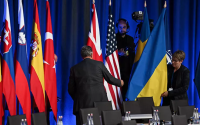September/October 2005Tikkun
Uri Avnery's opinions are not to be taken lightly. The most outspoken leader of Israel's peace movement, Avnery has in his own life mirrored the country he helped establish. Born in Germany in 1923, Avnery began his political life as a member of the Irgun, then served as an IDF commando in the 1948 war. For forty years the editor and publisher of Israel's now defunct newsweekly, Ha Olam Hazeh, Avnery served three terms in Israel's Knesset. With his wife Rachel, in 1993 he helped found Gush Shalom, one of Israel's most influential peace organizations. We spoke to Avnery two weeks before the withdrawal had formally begun.TIKKUN: Media accounts of the drama of withdrawal from Gaza make it seem as though we now have a struggle going on between the forces of good, represented by Sharon, and the forces of evil, represented by the settlers.Uri Avnery: The present situation is the culmination of a process that started immediately after the Six Day War, when Israel had a historic choice between making peace immediately and trying to annex the land that we had conquered. I am not speaking from hindsight, because even during the war, after we had conquered the West Bank and Gaza Strip, I sent an open letter to then–Prime Minister Levi Eshkol and asked him to immediately establish a Palestinian state in all of the Occupied Territories of the West Bank and Gaza Strip and make peace with the Palestinian people. Eshkol was typical of activists in the Zionist establishment, which, from the very beginning of Zionism, has been focused on providing space for Jewish refugees from around the world by getting new land on which to build settlements. So even when that land was no longer needed for refugees, one might say that from the very beginning, it's been part of the genetic code of the Zionist movement to create new settlements on more land of Arab Israel.
I don't want to sound mystical, but I believe that there is such a thing as a genetic code of historic movements, by which I mean the basic ideas that created the movement get embedded in them, and it is very difficult to change, even when circumstances have changed. Israel Zangwill's statement that Zionists were trying to put together "A land without people for a people without land," symbolized the Zionist movement and shaped the consciousness of the early Zionists. And I think this is a basic Zionist conviction. Zionism probably would not have produced its incredible achievements without this impetus, which has been to gain more land, settle more land, and enlarge the Jewish homeland until it reaches at least the Jordan River. It is this impetus that underlies all that we have done in the last hundred years.TIKKUN: At its inception, was the original desire to return to one's ancient homeland already a distortion, or was it a legitimate aspiration?UA: I think the Jewish people always desired to have its entire homeland back, in the form it imagined it had taken in the ancient world. But Zionism emerged in the nineteenth century as a national movement and shaped itself pragmatically in the framework of existing possibilities, given the realities of global politics. Until 1948, the desire to get more land and put more settlements on the land was restricted by the possibilities of the time. So in pre-1948 Palestine, the Zionist movement acquired land by buying it. Therefore, when the state of Israel came into being in 1948, the Jewish community, the Yishuv, had only 4 percent of the land of what was then British Mandate Palestine.
After the 1948 war, by force of arms, Israel acquired 78 percent of the land of Palestine as it existed under the British Mandate. Suddenly there were large new areas of land that could be settled. And in the first nineteen years of the state, this is what Israel did: It put new towns and villages on the land conquered in 1948 and brought in over a million Jews from Arab lands. A great part of the Arab community had been removed to make room for these new settlements and a large part of the land—even of the Arab community that remained—was expropriated.
What happened in 1967 is that we conquered the rest of Palestine. What changed was not the basic desire to acquire land, which has been there all the time, but the new possibilities of expropriating land and establishing settlements. This started in the 1968, under the Labor government of Levi Eshkol, followed by Golda Meir, and continued under Yitzhak Rabin, until the Likud first came to power in 1977.
Until 1967, the settlement enterprise was socialist-Zionist. It was based on the kibbutzim and the moshavim , and led by the Labor movement. What happened after 1967 was that a completely new element took over the settlement enterprise: the so-called "national religious camp" which is a very extreme mutation of Judaism. It is a completely new component of Judaism that has very little to do with Judaism as we knew it before. It is a messianic movement, a super-nationalist movement with fascist fringes.
This approach [represented] a very minor and even despised faction of Zionism before 1967. It took the settlement project over, robbed the socialist-Zionist camp of its original vision, and turned it into the hallmark of the national religious Zionist camp. And this is a change, not just in quantity, but also in quality. It is this camp which has become stronger every year for the last thirty-eight years. It has been promoted by all Israeli governments, whether Labor or Likud. It has been assisted not only by the Israeli army, but also by every part of the Israeli government and every ministry, both openly and covertly. This camp has become a very important force in Israeli society.TIKKUN: Why would secular socialists have allowed religious visionaries to become the center of the Zionist enterprise?UA: The old socialist part of the Zionist movement and the kibbutz movement has broken down. It is economically bankrupt, and, what's more important, it is ideologically bankrupt. A third generation has now come to the fore in the Labor Party, a generation without ideology, without any real motivation. They are as capitalist as other parts of Israeli society. They're out to make money. The Labor Party is nothing but a reeking cadaver today, and is typical of this process.
The religious Zionist movement has grown in force, ideological motivation, and fanaticism. It is a new kind of Jewish religion—a tribal religion, a very aggressive nationalist religion—and has elements (as I've said before) that must be characterized as fascist. And this force is now the only force in Israel that has a clear-cut ideology, that has thousands of people believing in it. Its thinking is clearly aimed at evicting the Palestinian population, and [creating] a homogeneous Jewish religious state, subject to the Halachah, and governed by rabbis. This is not often clearly articulated, but you can find it in the writings and the sayings of the leaders of this movement.TIKKUN: Why did the majority of Israelis allow that to happen?UA: That's a very good question, and it's not easy to answer. When a majority doesn't have a clear and dominant ideology, and is faced with a strongly motivated, ideologically fanatical minority, the majority is at a great disadvantage.
A majority of Israelis believe in democracy, but don't feel the urge to go out into the streets. For years, my friends and I have been demonstrating for an end to the Occupation, for peace with the Palestinians, and for democracy in Israel. We have experienced many heartbreaking moments when we called on people to come out and demonstrate and found that there is no force that can bring Israelis out, except on the annual day of mourning for Yitzhak Rabin. The only thing that mobilized these people was his murder and his memory. But it is very difficult to get them out for any other aim.
It is a basic weakness of democracy that the democratic majority only comes out when it is severely provoked. And what is happening now in Israel, perhaps, is that the provocation by the settlers may reach a point where it will succeed in provoking the majority of Israelis to come out and fight for what they believe is important.TIKKUN: Why did the Labor movement and the original Zionist enterprise lose its ideological appeal?UA: There is a group of party functionaries that are fighting among themselves over this cadaver. [Labor Party Chair and Current Deputy PM] Shimon Peres doesn't care about anything except his personal survival. There's no real leader there. The last person who looked like a leader and took hold of the party was Ehud Barak, and that ended in a terrible disappointment. And the Labor Party at this moment doesn't really exist in Israeli politics. It has no voice in Israeli society. During these weeks of crucial crisis in Israel, the Labor Party is just not there. They leave it to Sharon to fight, and they support him.
The Meretz Party is very weak, and has no real voice. It is not heard. It is not really fighting. Somebody might say that the whole political class in Israel is too satiated, too rich, too lazy, and too rotten to put up any real fight. And the masses of the people who could be in the streets at this moment went to the Likud. As a party, the Likud is dysfunctional because a great part of it is against Ariel Sharon. And Sharon cannot mobilize them. So the whole body politic is in a state of malaise. It is sick, and it's very sad and dangerous that this is happening at a time when Israel is nearing a historic crisis that will decide its future.
TIKKUN: What historic crisis?UA: The crisis is between [the democratic majority and] the settlers and everything the settlers represent, which is a theoretical state in which the rabbis are above the law and the rabbis fix the law. This is a situation very similar to Iran, where the religious leadership is above parliament and above government.
I'm optimistic by nature. I believe that Israeli society will overcome this crisis, and that the democratic majority will at the decisive moment find the inner strength to face this danger.
But this is not at all certain. What will happen at the decisive moment is very difficult to [forecast]. We don't yet know if this government will stand decisively for democracy. Sharon only has a majority because he dismissed the ministers who openly opposed him. Even now this is a government that is very unsure of itself, one in which important ministers like [former Finance Minister and current MK] Binyamin Netanyahu are openly rebelling against Sharon.TIKKUN: What about the security forces?UA: The Israeli army has not been prepared to fight against the settlers. For thirty-eight years, it has supported the settlers, cooperating with them both openly and covertly. Practically all the settlements are where they are because the Israeli army told them where to go. Nor have the police been trained or prepared for this kind of disengagement struggle, much less given reasons to believe in the necessity of fighting against the settlers. The police have been protecting the settlers and acting against the Palestinians for thirty-eight years now. They have been shooting at Israeli peace activists for the last few years. The police and the army go into action against the settlers without any weapons at all, with their bare hands.
All this shows that there is no clear will of the government to fight against the settlers. They find themselves in a fight that they did not expect to have. Sharon is completely bewildered, because when he started this so called "disengagement plan" he did not dream of entering a battle with the settlers. Quite the contrary. Ariel Sharon has been the father of the settlers more than any other person in the country. He put the settlements where they are and has worked tirelessly for years for the settlers. Sharon did not think that his plan was aimed against them. What he told the settlers was something like "we should give up a few settlements in the Gaza Strip, which are quite small and unimportant, in order to consolidate and save the big settlements in the West Bank and annex all the territory on which these settlements are sitting."
This sounded logical to Sharon. It is the logic of an army officer used to giving up territory in order to gain other territory. But the settlers did not accept it, and Sharon found himself unexpectedly confronted by them. This is a difficult situation, not only for Sharon personally, but for the entire Israeli political system to operate with any sense of consistency and determination because it [represents] a kind of cognitive dissonance.TIKKUN: It seems to me that certain settler arguments are reasonable with regard to their outrage at what's happening now, because some of the settlers are economically motivated. They moved to the Occupied Territories because of government promises, not ideology. Now they're being betrayed for reasons that have nothing to do with why they were encouraged to become settlers in the first place. Isn't there something understandable about their anger?UA: I don't feel any compassion for them, because every settler knew that they were settling on land taken by force from the Palestinians. They knew that they were settling on occupied territory whose future is undecided.TIKKUN: Was there any political party that was saying that to the settlers?UA: When I was in parliament, I said it and several other people said it. But you're right. All of the major parties encouraged people to go there and gave them economic incentives to do so. [But] all of this crying and weeping is a little exaggerated, because what are the settlers being requested to do? Move twenty miles north into Israel proper and establish the same kind of life they've had until now—at our expense. Yet the settlers think of this as [being equivalent to] the eviction of the Jews from Spain or from Germany in the middle ages. It is very, very much exaggerated. Their sense of outrage, I think, emanates from them feeling betrayed by the people who put them there, by their own people. By the people they considered their spiritual or political fathers. In this respect their sense of betrayal is real. It is like a son being betrayed by his father.TIKKUN: Some of us who support peace believe that the disengagement is a mach a zeh, a performance put on for the world to show how much Israel is suffering so as to provide more support for Sharon's desire to hold on to significant parts of the West Bank. So Sharon has decided to sacrifice the well-being of nine thousand people in order to perpetuate his control and Israel's control over the West Bank.UA: Sharon does have an interest in making this evacuation appear to be nearly impossible in order to demonstrate that if removing eight thousand settlers is such an immense and dangerous job, how could anyone consider moving two hundred and fifty thousand settlers from the West Bank? I think the Palestinians are right if they suspect this, because I suspect the sameTIKKUN: In order to show support for Sharon's disengagement plan, Labor and Meretz have backed the withdrawal without demanding that it be the first step in withdrawing from the West Bank. Do you think that this was a smart tactic on the part of people who actually want to end the Occupation in its entirety?UA: All of us in the peace movement have been faced with this dilemma. According to people who are close to Sharon, after Gaza we shall not retreat from any place whatsoever. There shall be no peace agreement, no final status negotiations, nothing. My friends and I are very careful to say that we do not support Sharon. On the other hand, any settlement that will be dismantled is one settlement less. And the dismantling of settlements does create a precedent that has immense psychological and maybe political importance for the continuation of the process. Therefore, whether we want it or not, we are compelled to support the disengagement from Gaza in order to facilitate the disengagement in the West Bank and the end of the Occupation in the West Bank. This is the dilemma we are faced with and which we must somehow try to deal with.TIKKUN: There was an argument that was once made by progressives who served in the territories. They said "…We need to honor our military obligations to the IDF now so that when there is a disengagement from the Territories, the Right Wing will have to honor their obligation to the IDF." Do you think that this has held up and proved to be true? Because from the newspaper accounts that we get here, it seems as if there have been elements of the religious and others who oppose the withdrawal who are refusing to follow orders.UA: I think the Right Wing in Israel does not give a damn what the Left Wing is doing. This threat of wholesale mutiny has nothing to do with the refusal by left-wing people to take part in the Occupation. Sometimes it is cited as a pretext, but the religious Right Wing in Israel has its own logic and has very little to do with anything else. They believe in what their rabbis say about Halachah and about the role of the Torah. They live in a completely closed, theocratic society that is not influenced by anything happening outside of it. They believe in their own world. In a way, they are like one of those American sects that ended in mass suicide: they are a cult. They look like a cult, and they behave like a cult. They dress differently and they behave differently. They're a different kind of people all together.
There is very little communication between them and us. They speak a different language. They have a completely different outlook on the world. They are subject to completely different laws and rules. They are a distinct part of Israel, separate from any other. This is what makes this situation different from confrontations in other countries. This is not an ordinary part of Israeli society; it is not that one brother is left wing and the other brother is right wing. These are people who live separately, in their own communities, religious neighborhoods, and towns in Israel. They have no contact with ordinary Israeli society. They meet Israeli society only in very special places, like the army. But even in the army they tend to have their own units.
One of the dangerous decisions made by the government of Israel was to establish specific religious units of the army. The pretext was that they need special units so that they can continue their religious studies and so on. But the fact is that now you have an Israeli Army Religious Unit that is subject to [the authority of] their rabbis more than to their military officers. This is why the prospect of a military mutiny is such a danger.TIKKUN: You said that getting out of the Gaza Strip and withdrawing from some of the settlements might be a first step toward getting rid of future settlements. What is a plausible strategy for the peace camp in the Labor Party and Meretz to start following this fall? What are the things that they will plausibly be able to do to challenge to Sharon's intent to hold on to the West Bank?UA: We must separate between two stages. The present stage takes place in July, August, and September, probably. We must support the withdrawal from Gaza. Not just by sitting in front of the television set and saying "This is a good thing." We must also come out, because this is not a private fight between the Israeli army and the police against the settlers; this concerns all of us. And if the settlers win at this stage, then we can kiss the state of Israel as we know it—and we want it to be—goodbye.
At the moment, the whole peace camp is not mobilized. It has not come out to fight. It's just not there. The majority of Israel is looking at this fight as if it were a spectator sport— something to be fought out between Ariel Sharon and the settlers, [while] we are merely onlookers enjoying the fight. This is a very, very dangerous situation. Our goal should be to turn the withdrawal from Gaza into a withdrawal from the West Bank. The task is to use the momentum gathered from this operation to bring about real peace negotiations with the Palestinians and achieve [a negotiated settlement] within a year or two.TIKKUN: What's a plausible strategy for mobilizing people on the issue of the West Bank? Is there any that exists?UA: No. There's nothing there because, first of all, there is no unified leadership of any kind on the left side of Israel. There is a very unified and very effective leadership on the right side. The settlers and their allies are beautifully organized. They have a clearly acknowledged rank and file leadership. They don't quarrel among themselves. They've succeeded in unifying the moderate and even the most extreme fascist elements into one camp. They can mobilize their people easily because their people are concentrated in the settlements and the religious yeshivot. There's nothing active on the Left. We only have the government and the Knesset and the political system, which is very weak and not very popular, and there's no leadership at all. We can only hope that once the battle has begun, and people are provoked and feel the need to fight back, that a leadership will emerge…I very much hope so.TIKKUN: Why has it been so difficult?UA: The great majority of Israelis are not aware of the real and present danger to Israeli democracy. They still have the illusion that this is something that will pass. Only when people realize that real danger is there and that people must come out and face it will there be a chance that some leadership will emerge. One can only hope that it will not be too late.
I'm very much reminded of the last days of the Weimar Republic. I think about it constantly. And I think that the dangers that people were facing at that time are here. It has been said that the Weimar Republic collapsed not because the fascists overthrew it, but because at the moment of truth no one was ready to step up and defend the Republic. This nightmare pursues me. I think about it all the time.






